The red path of Melanesia. How fought for independence in the New Hebrides and New Caledonia
Colonial era: the hunt for wood and blackbirds
30 July 1980. Another new state appeared on the world map - the Republic of Vanuatu proclaimed its political independence from Great Britain and France.
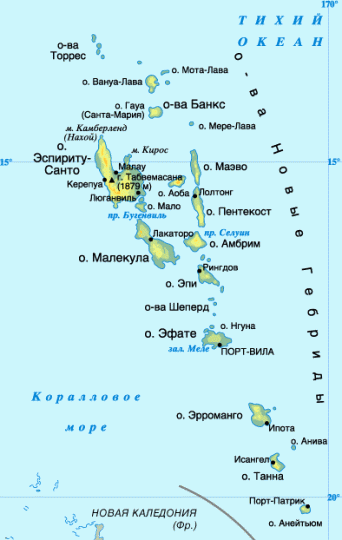 The New Hebrides, on which a new state appeared, had until this time been under joint Anglo-French administration. 3 March 1605 Portuguese navigator Pedro Fernandez de Quiroz, who was in the Spanish service, discovered the island, which he called “Austrian Land of the Holy Spirit” (the Spanish king was a representative of the Austrian Habsburg dynasty). The island of Espiritu Santo, nevertheless, was never colonized - the local Aborigines reacted to European navigators with hostility. In 1774, James Cook discovered several more islands and named the New Hebrides in the archipelago in honor of the Hebrides located near the Scottish coast. The islands were inhabited by Melanesians - representatives of the Australoid race. Only in the XIX century began the gradual development of the islands by Europeans. Sandalwood merchants were the first to arrive, followed by slavers and Christian missionaries. The terrible page in the history of the island was the so-called. "Hunt for blackbirds". Starting from the 1860's. from New Hebrides, in large numbers began to take out locals to work in Australian and Fijian reed and cotton plantations, as well as in the mines of New Caledonia. Although workers seemed to be recruited "voluntarily", in reality it was the real slavery. For four decades, until recruitment was prohibited in 1904, 40 thousands were removed from New Hebrides. Not all of them survived and were able to return home after the prohibition of the recruitment practice. “The hunt for blackbirds” is one of the main grievances inflicted on the New Hebrides by European colonizers. Another evil is the cutting down of precious sandalwood forests, which was also carried out by predatory methods, regardless of the desires of the local population. As for the activities of Christian missionaries, they certainly brought to life the islanders many elements of modern civilization, including literacy, basic medical knowledge, rejection of many animistic rites. But, at the same time, the Christianization of the New Hebrides caused significant damage to the national culture, because, thanks to the missionaries' activities, local languages and folklore were forgotten.
The New Hebrides, on which a new state appeared, had until this time been under joint Anglo-French administration. 3 March 1605 Portuguese navigator Pedro Fernandez de Quiroz, who was in the Spanish service, discovered the island, which he called “Austrian Land of the Holy Spirit” (the Spanish king was a representative of the Austrian Habsburg dynasty). The island of Espiritu Santo, nevertheless, was never colonized - the local Aborigines reacted to European navigators with hostility. In 1774, James Cook discovered several more islands and named the New Hebrides in the archipelago in honor of the Hebrides located near the Scottish coast. The islands were inhabited by Melanesians - representatives of the Australoid race. Only in the XIX century began the gradual development of the islands by Europeans. Sandalwood merchants were the first to arrive, followed by slavers and Christian missionaries. The terrible page in the history of the island was the so-called. "Hunt for blackbirds". Starting from the 1860's. from New Hebrides, in large numbers began to take out locals to work in Australian and Fijian reed and cotton plantations, as well as in the mines of New Caledonia. Although workers seemed to be recruited "voluntarily", in reality it was the real slavery. For four decades, until recruitment was prohibited in 1904, 40 thousands were removed from New Hebrides. Not all of them survived and were able to return home after the prohibition of the recruitment practice. “The hunt for blackbirds” is one of the main grievances inflicted on the New Hebrides by European colonizers. Another evil is the cutting down of precious sandalwood forests, which was also carried out by predatory methods, regardless of the desires of the local population. As for the activities of Christian missionaries, they certainly brought to life the islanders many elements of modern civilization, including literacy, basic medical knowledge, rejection of many animistic rites. But, at the same time, the Christianization of the New Hebrides caused significant damage to the national culture, because, thanks to the missionaries' activities, local languages and folklore were forgotten.On the New Hebrides from the middle of the XIX century. both British and French settlers began to settle. However, both Britain and France abstained from the direct annexation of the islands. In 1878, an agreement was even concluded between them on the refusal of each of the parties to seek the capture of the New Hebrides. In March 1906, an agreement was signed under which the New Hebrides were proclaimed by the Anglo-French condominium - a joint possession of Great Britain and France. The management of the islands was entrusted to both the British governor of Fiji and the French governor of New Caledonia. The city of Port Vila was built on the island of Efate, which became the capital of the condominium and the residence of the British and French resident commissars. However, the centralized administrative system on the islands was virtually absent - the British and French settlers were subordinate to their resident commissars, and the indigenous people continued to live according to their own customs, in fact left to their own devices and, therefore, suffering injustice from European settlers, especially in the area of land distribution . In the early 1920s French planters began to import Vietnamese workers from North Vietnam (Tonkin) onto the New Hebrides. Gradually, the number of the Vietnamese diaspora increased to 6 thousand people, but then fell significantly due to falling prices for copra and the departure of most of the workers home. During World War II, the New Hebrides were considered by the Anglo-American command as a likely base for conducting military operations against Japanese troops invading the Solomon Islands. In March 1942, American troops landed on New Hebrides. By the way, their presence in the region introduced a certain “revitalizing” stream into the canned social life of the islands. First, the Americans built a runway, connecting the islands with the outside world aviation message. Secondly, a military hospital was opened, the local population got the opportunity to work in the service sector of the American troops, which improved the financial situation of the New Hebriders. The spread of such a fairly well-known phenomenon as the cult of cargo dates back to the same time. It is based on a belief in the divine origin of food and household goods brought by Europeans or Americans, and the expectation of a ship or plane turns into a ritual. Followers of the cults of cargo built copies of runways from palm trunks and straw, performed dances, pre-painting themselves with the inscriptions “USA”.
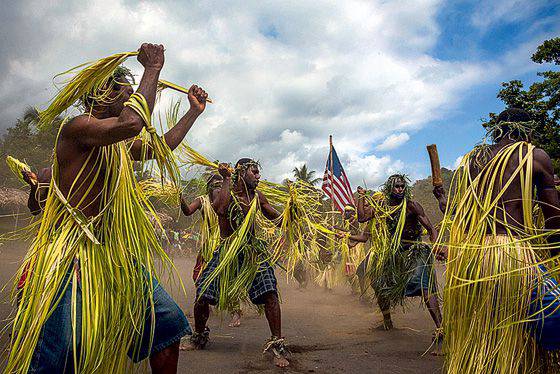
The movement of "John Froome" and the struggle for the land
In the second half of 1930, before the beginning of the Second World War, the cult of cargo, called “John Frum” (some linguists believe that the name comes from the phrase "), was widely spread on the island of Tanna, part of the New Hebrides archipelago. John from (America) ”). The cult of "John Frum" is usually associated with the name of a certain Manehivi, who preached the need to abandon all the innovations brought into life by European colonization of the islanders - from money, education, hired work, the Christian religion. In the event of a rejection of the European way of life, according to Manehivi, there was a transition to a new era in which all white people — both missionaries and settlers — planters and administrators — would leave the islands forever and leave their property to the indigenous people. In 1941-1942 there was a massive relocation of the inhabitants of the island of Tanna from coastal areas to the interior of the island and a return to traditional foundations. The landing of American soldiers promoted further popularization and certain changes in the ideology of the John Froom movement. The islanders built models of runways and airplanes, women were on duty at improvised aerodromes with “headphones” - dummies that flow into trance and, allegedly, enter into communication with the “John Frum plane”. After the end of the Second World War and the departure of American soldiers from the islands, the movement "John Froome", nevertheless, continued to exist. In 1957, his leader Nakomaha created the Army of Tanna, a religious organization that conducted regular parades of worshipers. Celebrations are still held - under the American flags, the islanders, painted with the inscriptions "USA" and "Army Tanna USA", depict the drill of American soldiers. It is significant that in 1970-s. followers of the cult "John Fruma" opposed the granting of political independence to Vanuatu, because they believed that Western forms of statehood are contrary to the traditional foundations of the islanders and would bring nothing good into their lives. They say you can live and maintain colonial dependence, the main thing is to perform the rituals of your cult.
In the post-war years, both British and French authorities gradually began to develop on the islands a social infrastructure - education and health care. The first Melanesians began to be employed in the institutions of the colonial administration. However, at this time there were also serious economic contradictions that became political. Since the standard of living in post-war Europe and Australia has increased significantly, British and French settlers in the New Hebrides decided that the development of animal husbandry on the islands with the subsequent export of meat to the metropolis would be very profitable. But the implementation of this plan required the expansion of agricultural land suitable for animal husbandry. Planters began to practice the seizure of agricultural land from the local population, regardless of his opinion. After one of the leaders of the islanders, Buluk, appealed to the condominium administration with a request to stop the illegal actions of the planters, he was arrested and placed in prison for a period of six months.
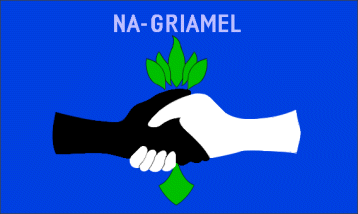 As a result of the growth of social tension, the anti-colonial movement “NaGriamel” was formed, headed by a local resident of ridiculous (Scottish and Tongan) origin, Jimmy Stevens. The goal of the Stevens movement was to consolidate the right to own and dispose of the land resources of the islands to local residents, and to revive the traditional values of the Melanesians. After the leader Buluk was released from prison in 1964, he also joined the Stevens movement. In 1965, during one of the meetings of supporters of the movement, held in the bar of Robert Kronsted, the “Law on the darker more often” was passed, which prohibited European planters from expanding their holdings at the expense of island forests. Stevens activists have found a very rational way out of the situation and a way to resist the land expansion of planters - villages were built in disputed territories. The first of these was Tanafo - “Fruit Basket”. In 1967, a rather impressive group of movement activists settled there. But the administration of the New Hebrides considered the actions of Stevens and his supporters illegal, so Stevens and Buluk were arrested and put in prison for six months. By 1970, the movement went beyond Espiritu Santo and embraced the neighboring islands of Malekula, Ambrim, Oba, Paam, Maewo and Malo. But soon began the decline of the movement, due to the lack of his supporters of financial resources for the development of their own settlements.
As a result of the growth of social tension, the anti-colonial movement “NaGriamel” was formed, headed by a local resident of ridiculous (Scottish and Tongan) origin, Jimmy Stevens. The goal of the Stevens movement was to consolidate the right to own and dispose of the land resources of the islands to local residents, and to revive the traditional values of the Melanesians. After the leader Buluk was released from prison in 1964, he also joined the Stevens movement. In 1965, during one of the meetings of supporters of the movement, held in the bar of Robert Kronsted, the “Law on the darker more often” was passed, which prohibited European planters from expanding their holdings at the expense of island forests. Stevens activists have found a very rational way out of the situation and a way to resist the land expansion of planters - villages were built in disputed territories. The first of these was Tanafo - “Fruit Basket”. In 1967, a rather impressive group of movement activists settled there. But the administration of the New Hebrides considered the actions of Stevens and his supporters illegal, so Stevens and Buluk were arrested and put in prison for six months. By 1970, the movement went beyond Espiritu Santo and embraced the neighboring islands of Malekula, Ambrim, Oba, Paam, Maewo and Malo. But soon began the decline of the movement, due to the lack of his supporters of financial resources for the development of their own settlements. Melanesian Socialism of Pastor Liney
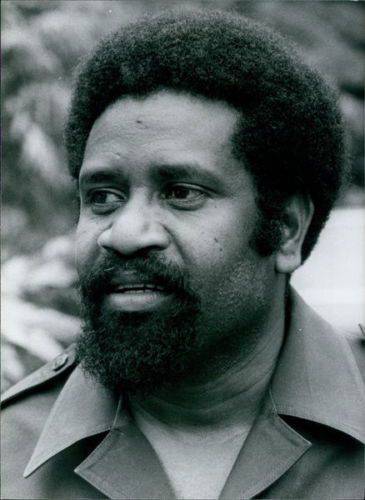 The policy of Great Britain and France regarding the New Hebrides in the 1960s. radically different. If Great Britain focused on the gradual preparation of the islanders for the creation of an independent state, France, which had pursued a colonialist and imperialistic policy during the years of General Charles de Gaulle, did not intend to part with the New Hebrides and even increased its naval presence in the region. In accordance with the interests of Great Britain and France, the polarization of the politically active inhabitants of the New Hebrides took place. At the beginning of 1971, the pro-British New Hebrides Cultural Association was created, soon transformed into the New Hebride National Party. She advocated the independence of the New Hebrides and received the support of English-speaking Melanesians and people of mixed origin. In 1974, the Union of the New Hebrides and the Autonomy Movement of the New Hebrides appeared in response to its activities, targeting the French-speaking population of the islands and opposing the independence of the New Hebrides.
The policy of Great Britain and France regarding the New Hebrides in the 1960s. radically different. If Great Britain focused on the gradual preparation of the islanders for the creation of an independent state, France, which had pursued a colonialist and imperialistic policy during the years of General Charles de Gaulle, did not intend to part with the New Hebrides and even increased its naval presence in the region. In accordance with the interests of Great Britain and France, the polarization of the politically active inhabitants of the New Hebrides took place. At the beginning of 1971, the pro-British New Hebrides Cultural Association was created, soon transformed into the New Hebride National Party. She advocated the independence of the New Hebrides and received the support of English-speaking Melanesians and people of mixed origin. In 1974, the Union of the New Hebrides and the Autonomy Movement of the New Hebrides appeared in response to its activities, targeting the French-speaking population of the islands and opposing the independence of the New Hebrides. Among English-speaking supporters of independence, the young Anglican priest Walter Leane (1942-1999) gradually moved to the key positions. A native of Pentecost, Walter Lini was educated at a mission school, and then in New Zealand, where in 1970 and was ordained a priest. The political views of Walter Leane were greatly influenced by the ideas of African socialism. Walter Leaney was convinced that for Melanesians, including for the residents of Vanuatu, collectivist principles of solidarity, mutual aid, community property were inherent. Distribution was based on the principle “from a person - the ability to share, to a person - according to his needs”. This is how the ideology of Melanesian socialism was formed, which, to a large extent, managed to change the social and political face of the New Hebrides, influencing the political life of other island possessions and states. In 1974 was The New Hbridge National Party was renamed the Vanuaca Party, as its founders decided to return to traditional national names and lifestyles. The Vanuaca Party has embarked on a general referendum on the political future of the islands, hoping that the idea of the political independence of the New Hebrides will win the referendum. In 1975 was The first municipal elections were held in Port Vila and Luganville, the main cities of the New Hebrides. In 1977 was The party of Vanuaca created the People’s Provisional Government, and on November 29 1977 Party activists tried to raise the flag over the headquarters in Port Vila, but met with resistance from political opponents. In 1978 was former police officer George Calzacau was elected Chief Minister of the New Hebrides, and Walter Leane became his deputy. In 1979 was A constitution drafting committee began its work comprising representatives of political parties and the Council of Elders. France and the United Kingdom agreed on the date of independence of the islands, which was scheduled for July 30 1980. According to the enacted Constitution, in November 1979. The first parliamentary elections were held, which were won by the Vanuaca Party. Walter Leney became Chief Minister of the Council of Ministers of the New Hebrides. However, an influential opposition minority did not agree with the victory of the Vanuaca party. Riots began in Luganville, and 28 in May 1980 The oppositionists seized the building where the British District Agency was previously located, and declared Espiritu Santo Island and a number of nearby islands the independent state of Vemeran. Jimmy Stevens, who previously led the movement for the liberation of island lands, became known as the head of state. The situation in Luganville led to the fact that 30 June 1980 British and French paratrooper detachments liberated buildings captured by Stevens supporters. Jimmy Stevens was arrested and sentenced to 14,5 years in prison for organizing riots. July 30 1980 city The creation of an independent Republic of Vanuatu was proclaimed. Its first prime minister was Walter Lenee, who actually proclaimed a course of socialist orientation of the islands. In the early years of its existence, Vanuatu began to develop bilateral relations with other countries of a socialist orientation, including Cuba and Libya. Relations with France remained strained, including because Walter Lini accused Paris of preserving colonialism in New Caledonia, another Melanesian archipelago. One of the ideas of Walter Leaney was the creation of the Melanesian Federal Union, which would contribute to the improvement of the economic situation of Melanesia and the preservation of Melanesian traditional values. However, this project was not destined to be realized.
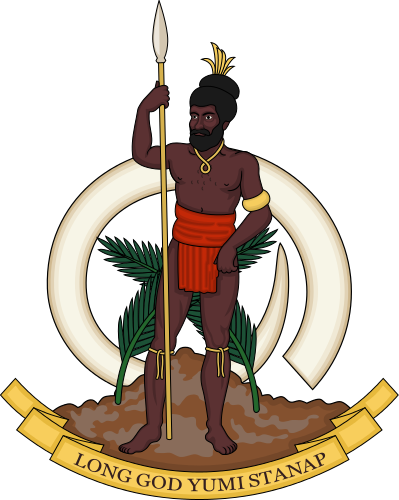
Until now, this state remains one of the poorest countries not only in the world, but also in Oceania. In 1991, Mr. Walter Lini, due to numerous socio-economic problems and political scandals, was forced to resign as prime minister. However, the party Vanuaku, whose ranks he also left, maintains a strong position in the country up to the present. Currently, the Prime Minister of Vanuatu is Sato Kilman of the People’s Progressive Party, whose government recognized the independence of Abkhazia. In the political life of Vanuatu, the Council of Elders - Malvatu-Mauri, which includes the traditional leaders elected by other leaders who are members of the district councils of leaders, still plays a big role. The elders do not have legislative power, but discuss cultural issues and advise the government of the country. The issues of culture and education in Vanuatu are really very important, since there are from 60 to 100 languages on the islands, which significantly complicates the communication between the islanders among themselves and even school education for children from peasant families. Therefore, Vanuatu is forced to maintain three state languages - English, French and “Bislama” - “Black English”, with a large number of lexical borrowings from local languages, serving as a means of interethnic communication of the archipelago’s population. Despite the fact that primary school education in the country is free, many children are forced to leave school to help their parents.
New Caledonia - one of the last colonies of France
If Vanuatu still managed to achieve independence, the people of New Caledonia are still trying in vain to find freedom. But the plans of France, which retains control over New Caledonia, do not include the independence of this overseas territory.
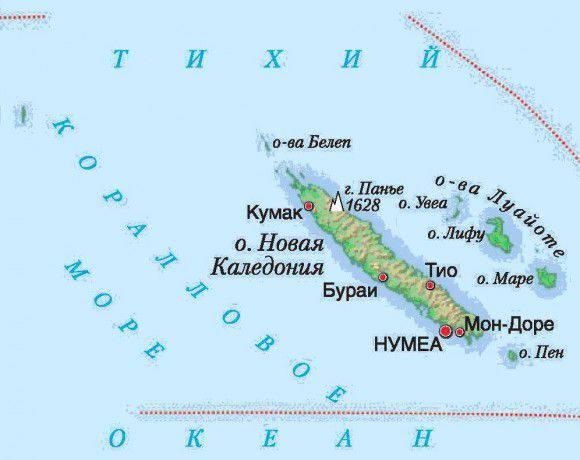 New Caledonia - one of the largest overseas possessions of France in the Pacific Ocean. The island of New Caledonia and several other smaller islands that form the same overseas administrative-territorial entity are located in the southwestern part of Oceania - in Melanesia. The population of New Caledonia is about 250 thousand people, and the indigenous part of the population is represented by Melanesians belonging to the Canakan people, as well as immigrants from neighboring Melanesian and Polynesian islands. New Caledonia was discovered in September 1774 by the expedition of Captain James Cook. From the end of the 18th century, the first whalers and merchants of the santal tree began to appear here, a little later the settlements of Protestant missionaries appeared. In 1850, a group of French officers who arrived on the ship to the island of New Caledonia, found it a suitable place to house the prison, and on September 24, 1853, the expedition of Rear Admiral Febrje-Despanthe declared New Caledonia to the French colony. Administratively, the colony was subordinated to the commissioner of the Tahiti protectorate. 25 June 1854 The French military base was established in the southwestern part of the island. It marked the beginning of the city of Noumea, which became the administrative center of New Caledonia. In 1860, New Caledonia was separated from the protectorate of Tahiti and became a separate administrative entity. Initially, the French authorities stimulated the settlement on the island of exiled criminals. A prison was created here, a settlement for the exiles, and later free settlers began to arrive - farmers who created plantations on the west coast of New Caledonia.
New Caledonia - one of the largest overseas possessions of France in the Pacific Ocean. The island of New Caledonia and several other smaller islands that form the same overseas administrative-territorial entity are located in the southwestern part of Oceania - in Melanesia. The population of New Caledonia is about 250 thousand people, and the indigenous part of the population is represented by Melanesians belonging to the Canakan people, as well as immigrants from neighboring Melanesian and Polynesian islands. New Caledonia was discovered in September 1774 by the expedition of Captain James Cook. From the end of the 18th century, the first whalers and merchants of the santal tree began to appear here, a little later the settlements of Protestant missionaries appeared. In 1850, a group of French officers who arrived on the ship to the island of New Caledonia, found it a suitable place to house the prison, and on September 24, 1853, the expedition of Rear Admiral Febrje-Despanthe declared New Caledonia to the French colony. Administratively, the colony was subordinated to the commissioner of the Tahiti protectorate. 25 June 1854 The French military base was established in the southwestern part of the island. It marked the beginning of the city of Noumea, which became the administrative center of New Caledonia. In 1860, New Caledonia was separated from the protectorate of Tahiti and became a separate administrative entity. Initially, the French authorities stimulated the settlement on the island of exiled criminals. A prison was created here, a settlement for the exiles, and later free settlers began to arrive - farmers who created plantations on the west coast of New Caledonia. Gradually, the number of European settlers caught up with the indigenous population of the island, and the constant expansion of plantations led to serious controversy, which were based on land disputes. On the island was introduced a code of laws that determined the rights (or, in fact, their actual absence) of Aboriginal people. In particular, the latter had to pay taxes, participate in public works, but at the same time did not have any real civil rights - neither participation in government bodies, nor ownership of their own lands. In 1897, the French administration began to create reservations for Aboriginal people, which led to a further deterioration in the economic situation of the indigenous population, an increase in inter-clan clashes due to scarce land, alcoholism and epidemics among local residents. Periodically, the Kanaks revolted against the administration, but the French authorities suppressed them without problems, given the small number of natives, the lack of modern weapons and ideas about the tactics of warfare. Nevertheless, the global political changes that took place in the life of Europe in the middle of the twentieth century could not but affect the colonies of European states. In 1946, all citizens of New Caledonia, including Aboriginal people, were granted French citizenship. However, here, too, the French authorities cheated - they began to encourage emigration of people from neighboring islands to New Caledonia, for example, from Wallis and Futuna. In addition, a large number of Vietnamese workers were brought to work on French plantations. As a result, the number of Kanaks, which was slightly higher than the number of European settlers, was generally lower than the number of all other ethnic groups living on the island. As for the land policy, in this area there also remained an obvious injustice towards the representatives of the Kanak population. Meanwhile, a growing number of yesterday’s colonies in Oceania proclaimed their political independence.
Kanaki in the struggle for their release
The decolonization of the Pacific Islands contributed to the emergence and growth of the national liberation movement among the Kanaks of New Caledonia. The ideas of Melanesian socialism, popular in the neighboring New Hebrides, began to spread on the island. However, unlike New Hebrides, the Kanaks were more radical. They enthusiastically embraced the ideas of Father Walter Lini to create a Melanesian federation consisting of Vanuatu, Papua New Guinea, the Solomon Islands, Fiji and New Caledonia. The Kanaks accused the French colonialists of the enormous damage inflicted on the people of New Caledonia by destroying the national culture, forms of social organization, seizing land, exploiting natural resources and pollution of the environment, and finally - directly reducing the size of the island’s indigenous population. The fact is that if before the beginning of colonization in 1774, on the island there lived from 40 to 80 thousands (according to various estimates) of Aboriginal people - Kanaks, then by the beginning of the XX century The Kanak population in New Caledonia fell to 21 thousand. Only in the second half of the twentieth century. due to the increased availability of medicine and the general improvement of the standard of living, the Kanaks managed to increase their numbers. Currently, about 100 thousands of Kanaks live on the island, constituting just over 40% of the population of New Caledonia.
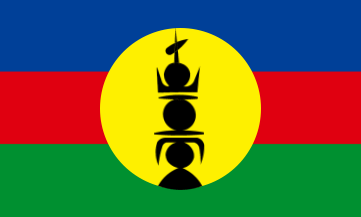 In the early 1970-ies. in Caledonia, political parties of the left and left radical orientation began to appear rapidly, oriented toward the achievement of the Novokedonyans of national independence. In 1979 was the Front for Independence was created, which included several moderate and radical left-wing parties. In 1984 was on the basis of the Front for Independence, the Kanak Socialist Front for National Liberation (KSFNO) was created (Front de Libération Nationale Kanak et Socialiste, FLNKS). A number of political parties have entered the front, which it makes sense to talk about in more detail. The Caledonian Union, a center-left political party, was formed after the end of the Second World War and spoke in favor of granting New Caledonia the status of a freely associated territory. The National Union for Independence is a left-wing socialist bloc of political parties and organizations advocating for the complete independence of New Caledonia. At various times, it consisted of: 1) The Melanesian Progressive Union is a political party founded by Edmond Nekiriai back in 1974. and most popular in the villages of the northwestern part of New Caledonia. Initially, the Melanesian Progressive Union focused on cooperation with the Trotskyist Revolutionary Communist League of France; 2) The Socialist Party of Caledonia, which existed from 1971 to 1985. among the white population of the island and oriented to the Socialist Party of France. In 1985 was the party disbanded, and its activists became simply members of KSFNO; 3) The Kanak Liberation Party is a radical left organization founded in 1975. novokedontsami, who studied in france and adjoined there to the movement of the "new left". The Kanak Liberation Party spoke from Marxist-Leninist positions — for the complete independence of New Caledonia, the nationalization of industry and the transfer of land to Kanak communities; 4) The Kanak Socialist Liberation - a party that emerged in 1981 after the departure of the Marxist group Nidoish Nasselin from the Kanak Liberation Party, in connection with Nasselin’s dissatisfaction with the cooperation with the French Socialist Party; 5) The Oceanian Democratic Movement is a political organization of Polynesian communalists, operating on the Wallis and Futuna Islands and defending the interests of representatives of the Uvea and Futuna ethnic groups. The Kanak Liberation Party has long remained one of the most radical left groups of the national liberation movement in New Caledonia. At its origins stood Nidoish Nasselin (b. 1945), which is in 1960's. studied law and sociology in France and there in 1968. created the Kanak left-wing student group "red scarves". In 1969, 1972, and 1978 Nasselin was repeatedly jailed for participating in the radical opposition movement. However, he later delimited the ultra-radicals and moved to more moderate positions.
In the early 1970-ies. in Caledonia, political parties of the left and left radical orientation began to appear rapidly, oriented toward the achievement of the Novokedonyans of national independence. In 1979 was the Front for Independence was created, which included several moderate and radical left-wing parties. In 1984 was on the basis of the Front for Independence, the Kanak Socialist Front for National Liberation (KSFNO) was created (Front de Libération Nationale Kanak et Socialiste, FLNKS). A number of political parties have entered the front, which it makes sense to talk about in more detail. The Caledonian Union, a center-left political party, was formed after the end of the Second World War and spoke in favor of granting New Caledonia the status of a freely associated territory. The National Union for Independence is a left-wing socialist bloc of political parties and organizations advocating for the complete independence of New Caledonia. At various times, it consisted of: 1) The Melanesian Progressive Union is a political party founded by Edmond Nekiriai back in 1974. and most popular in the villages of the northwestern part of New Caledonia. Initially, the Melanesian Progressive Union focused on cooperation with the Trotskyist Revolutionary Communist League of France; 2) The Socialist Party of Caledonia, which existed from 1971 to 1985. among the white population of the island and oriented to the Socialist Party of France. In 1985 was the party disbanded, and its activists became simply members of KSFNO; 3) The Kanak Liberation Party is a radical left organization founded in 1975. novokedontsami, who studied in france and adjoined there to the movement of the "new left". The Kanak Liberation Party spoke from Marxist-Leninist positions — for the complete independence of New Caledonia, the nationalization of industry and the transfer of land to Kanak communities; 4) The Kanak Socialist Liberation - a party that emerged in 1981 after the departure of the Marxist group Nidoish Nasselin from the Kanak Liberation Party, in connection with Nasselin’s dissatisfaction with the cooperation with the French Socialist Party; 5) The Oceanian Democratic Movement is a political organization of Polynesian communalists, operating on the Wallis and Futuna Islands and defending the interests of representatives of the Uvea and Futuna ethnic groups. The Kanak Liberation Party has long remained one of the most radical left groups of the national liberation movement in New Caledonia. At its origins stood Nidoish Nasselin (b. 1945), which is in 1960's. studied law and sociology in France and there in 1968. created the Kanak left-wing student group "red scarves". In 1969, 1972, and 1978 Nasselin was repeatedly jailed for participating in the radical opposition movement. However, he later delimited the ultra-radicals and moved to more moderate positions. 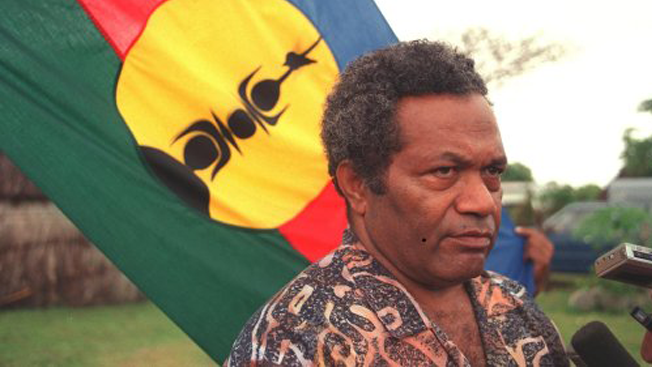
In 1985 was KSFNO began campaigning for the creation of an independent state of Novokledlon. At that time, the front was headed by Jean - Marie Tzhibau (1936-1989) - an outstanding Kanak revolutionary who studied at the Sorbonne and was a specialist in ethnology. Tzhibau advocated the creation of an independent state of Kanaka, and in 1977 He won the municipal elections and became the head of the province of Yengen. In 1984 was Tzhibau was elected leader of the Kanak Socialist Front for National Liberation and chairman of the provisional government of New Caledonia (a self-proclaimed structure created by supporters of complete political independence). 1984-1985 years. became a period of maximum confrontation between the Kanaks and the French administration. Several roads were blocked on the island, political demonstrations were constantly held, and the provisional government created by Tzhibau boycotted the municipal elections. Gradually, the situation escalated to the limit, actually approaching the brink beyond which a civil war could begin at any moment. January to June 1985 The French government imposed a state of emergency on the territory of New Caledonia. In October 1987 Tzhibau submitted to the UN a draft constitution of the Kanak state. By the end of 1980's under the leadership of Tzhibau began mass popular demonstrations, accompanied by clashes with the police. An armed wing was formed in the ranks of the Kanak Socialist Front for the Liberation of the People's Liberation, oriented toward achieving independence through an armed partisan struggle. In April - May 1988 The militants of the front took hostages on Uvea 27. Among the latter were the judge and the officers of the French gendarmerie stationed on the island. Militants demanded the immediate granting of political independence to New Caledonia, but the French government refused any negotiations and launched an armed operation. The French ships with marines aboard arrived in New Caledonia. From the ship "Mokez" was opened fire on the settlement of the Kanaks on the island of Pueblo. The separatists, frightened by such a turn of events, freed part of the hostages. However, other hostages continued to be held in the grotto on Uwea. Then the French special forces carried out the operation “Victor”, during which the grotto was taken by storm on the night of May 5 and the hostages released. An 19 Kanak man died during the operation. Moreover, most of the Kanaks were killed after the liberation of the hostages and the cessation of resistance - that is, there was an extrajudicial killing of militants. As a result of the tragedy at Uwea, the French leadership was forced to make a significant compromise with the national liberation movement. 5 May 1988 city an agreement was adopted in Noumea, which recognized colonization as a positive and negative phenomenon, proclaimed two equal parties in New Caledonia — the Kanaka and other national communities of New Caledonia, proclaimed a policy of preserving the Kanak national culture, and using the Kanak theme in the national symbolism of New Caledonia. 26th of June 1988 the post of high commissioner, who was previously in charge of direct administration of New Caledonia, was abolished. However, in May 1989
The situation in New Caledonia is aggravated by the fact that most European and Asian migrants are opposed to the declaration of state independence of New Caledonia, as they fear the coming to power of Kanak nationalist forces and possible discrimination. Therefore, in a democratic way to achieve the independence of New Caledonia from France is virtually impossible. And the Kanaks are forced to be content with priority positions in those areas where they manage to win municipal elections and hold their candidates for local government and self-government. In addition, one should not forget that France has substantial military interests in New Caledonia, which it is unlikely to give up in the foreseeable future.
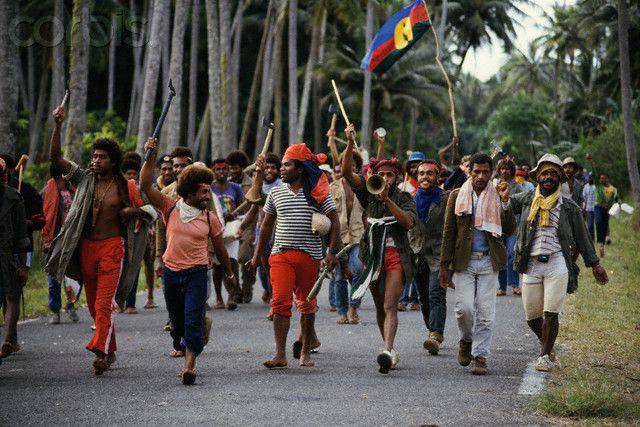
Thus, we see that the historical destinies of the two countries of Oceania, in which the ideas of national revival through the socialist path of development (Melanesian socialism) were most prevalent, took shape differently. The people of Vanuatu have gained state independence and have been building a sovereign state for 35 for years, facing, like every former colony, many difficulties. As for the indigenous people of New Caledonia, they are still trying in vain to secede from France and create their own national state. But the forces are too unequal, and if ever New Caledonia gains full state independence, then only if France itself decides on this step. In the meantime, New Caledonia is of economic and military-political interest for the French state, Paris will resort to any measures, just to prevent this distant overseas territory from escaping its control.
Information